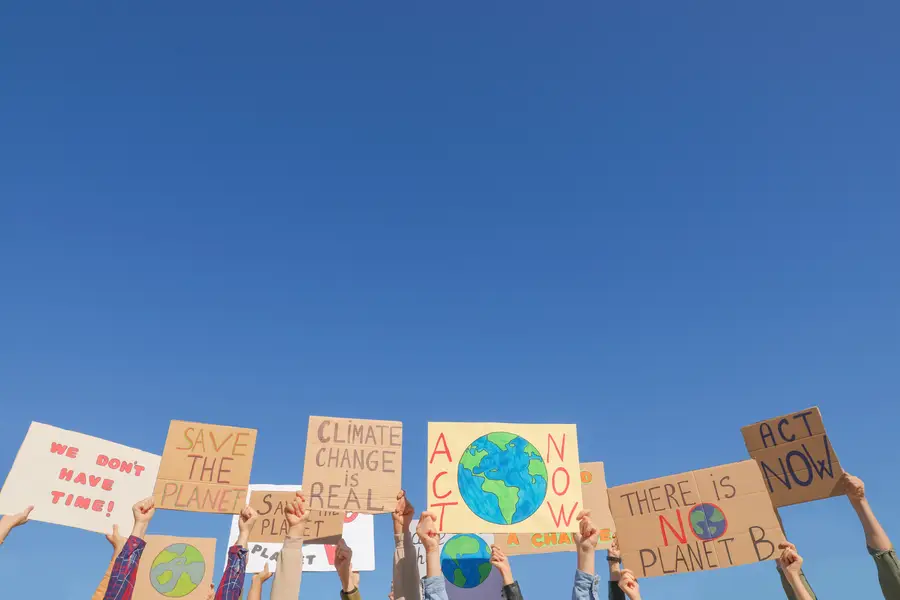
Youth worldwide are increasingly engaged in fighting climate change, whether as activists, policy wonks, teachers and students, health care workers, visionaries, entrepreneurs, or in many other roles. Given that this is the largest generation of youth in history—1.8 billion people are between the ages of 10 to 24—they have tremendous potential to make a significant difference in how we approach this critical issue.
Young people were out in force at the recent COP28. Their participation this year was officially encouraged and sanctioned through a ministerial-level position—Youth Climate Champion— created to liaise between young activists and various government officials. The International Youth Climate Delegate program also supported 100 young delegates with capacity-building and funding, and the first-ever Youth Stocktake convened to identify ways of including youth in climate negotiations and amplifying their voices.
As a student at Duke University pursuing a master's in public health, I saw COP28 as an opportunity to learn about international climate negotiations and the intersection of climate and health from RTI experts. Once there, I enjoyed meeting other young people and hearing their perspectives on climate change, which seemed to reflect five key points. In a bid to amplify diverse youth voices, I’m sharing the personal views of 11 young people who represent a range of countries and interests at COP28.
1. Climate Crunch: Youth Voices Amplify the Urgency
Youth are strongly motivated by the overwhelming sense that their lives and future are on the line, which strengthens their drive to actively participate in climate discussions and to be heard.
“Youth are the main powerhouse of society and lead in social transformation. They are great innovators in technological solutions vital for climate action. They are also vulnerable to the climate crisis, specifically through the rise of unemployment and mental health illnesses due to climate catastrophes,” said Amanda Suarez, a Local Conference of Youth coordinator from Recife, Northeastern Brazil.
“Climate issues are problems caused by an older generation that won't see the effects of their actions. Our generation will suffer the consequences. If we do not speak up about climate justice, these problems will be compounded and be on us. We don't really have a choice,” said Otto Olafsson, a recent Brown University graduate from Nashville, Tennessee, now working as a climate and health researcher at Fundación Plenitud in the Dominican Republic.
2. Sharing Lived Experiences from the Front Lines of Climate Change
First-hand experience with the impacts of climate change, such as witnessing floods, droughts, mudslides, and coastal erosion, is a powerful motivating force for young people.
“As a young person from a lower-income part of South Africa, climate change is already hitting us hard, and we are not just losing our homes and livelihood; we are also losing our culture and identity,” said Sibusiso Mazomba, a student and activist with the South Africa delegation.
“Climate change is real. I come from a coastal zone in Senegal. We've witnessed coastal erosion leading to declining fish population and rising sea levels covering previously occupied land,” said Mouhamadou Lamine Basse, a Senegalese International Youth Delegate currently based in Canada.
“The crises are happening every day. What we are doing at COP isn't about the future; climate change is happening now,” said Nouran El Marsafy, a researcher and activist from Cairo, Egypt who works on climate, gender, and urbanization.
3. Taking a Human-Rights Approach to the Climate Crisis
Youth recognize that an effective response to climate change must go beyond energy policy to address underlying issues of health, equity, and social justice.
“This is the moment to say, let's not just increase renewable energy but also change how we interact and run our societies,” said Nova Tebbe, a doctoral student at the University of Madison, Wisconsin, who explores how to maximize the health co-benefits of climate policy.
“The climate crisis is deeply rooted in issues of the past: colonialism and exploitation of indigenous people. Addressing the climate crisis is more than just transiting to another form of energy. It is about addressing those systems of injustice to ensure people who are usually marginalized have a say in any decision that affects their lives,” said Sibusiso Mazomba.
4. Youth Claiming their Seat at the Climate Table
Young people are ready and willing to engage in climate issues. They want greater recognition of what they can bring to the table and more opportunities for participation.
“Youth are already encouraged. We need meaningful engagement. We need to define what meaningful engagement looks like. That is how we can take proper action in the space. One banging plate can make a little noise, but many banging plates make a louder noise,” said Akhilesh Anil Kumar, founder of the Bring Back Green Foundation in Kerala, India.
“We have fresh ideas that would be valuable in these negotiation rooms. We are the ones who will be sitting on the negotiation tables in 5 to 10 years. We need to understand how these negotiations work,” said Simeon Kalua of Lilongwe, Malawi, who is participating in a Point of Progress exchange program with Norway focusing on climate justice in relation to agriculture, youth, and gender.
“I think it is important to acknowledge the huge impact young activists and social movements have had in mobilizing for climate action. Also, to have up-to-date teaching about the climate crisis makes an important difference. For me it was encouraging to see senior scientists and WHO staff being emotional about the topic and encouraging young scientists to engage in activism,” said Luise Nottmeyer, a public health researcher from Heidelberg University in Germany.
“COP28 changes the dynamic for youth participation and inclusion. Throughout this COP, I have met many young people who felt their voices were heard and taken seriously,” said Mouhamadou Lamine Basse.
5. COP28: Expectations vs Reality
Though their expectations were not entirely met at COP28, youth remain committed to the cause.
“I am frustrated because it is the 28th COP, and I don't really think we have achieved something significant for climate action to maintain the global temperature of 1.5 degrees Celsius. Governments and businesses persistently retain fossil fuels and resist green solutions. A lot of money has been spent for people to attend this conference, so many came with great expectations, but little progress has been made. But I am hopeful because of the people I have met, and they will continue their climate action work until we reach our goals,” said Maria Kolesnikova, a UN Earth Champion recognized for best clean air campaign in Central Asia.
“The Faith Pavilion at COP was really special. It was the first time they had this space dedicated to Faith, Climate, and Actions in COP. They had very important sessions, like discussing climate anxiety, which is the big challenge now facing a lot of youth who want to work on the issues related to climate. The sessions about involving religious leaders in climate actions were so interesting. They talked about how these leaders are super close to their communities and listened to. Getting them involved can make a big impact because they can inspire their communities to take action on climate change. It's cool to see how much they can influence positive change!” said Sabrina Said Soud, executive director and founder of Thamini Jamii Organization in Zanzibar, Tanzania.
About the author: Gedion is a medical doctor from Tanzania pursuing his Master of Science in Global Health at Duke University. He enrolled in the Duke’s United Nations Framework Convention for Climate Change course to understand global climate negotiations. He is interested in propelling the advocacy and research on the intersection of climate and health.
